There were a few moments while watching Black Panther (2018, dir. Ryan Coogler) in which I found myself laughing out loud in the theater, and it wasn’t because there was anything particularly humorous happening on screen. I mostly laughed because I wondered how director Ryan Coogler was able to accomplish something so simple and yet still unheard of during my long tenure as a cinema-junkie. Coogler has succeeded in making a film which fully embraces the spirit of Marvel’s most prolific and influential society while also proving that Black Panther, a movie which celebrates black culture so thoughtfully, can also entertain, enthrall, and challenge its audience. More importantly, the reasons why Black Panther works on so many levels are a result of the ways Coogler and his production crew marry the theme of conflict and tradition through every single aspect of the movie, creating a rich tapestry that you would be hard-pressed to find in most movies of the genre.
Fashion and World Building- Setting the Stage for Visual Conflict
Let’s start with my favorite scene of the movie to explain what I mean by visual conflict. After a brief flashback, the film’s narrative begins with its chief protagonist T’Challa (played by Chadwick Boseman) surviving a grueling fight on a cliff-side, an arena called Warrior Falls, to become the new king of Wakanda. Surrounded by the various tribes that make up this rich civilization, each donning their cultural garbs, T’Challa stands as the new ruler of this powerful country. At any point during this sequence, and without watching the rest of the movie, one could assume that this is a tale of a lost civilization.
Following this, there is a meeting in which the same tribal leaders are in attendance, but now they donned suits and dresses that would dominate every current runway, from Beijing to France and back. The Wakandan fashion is a mix of new and old: directly infused with African print from places such as Nigeria, South Africa, and Senegal, and yet exploding outward into some of our best science fiction attire. They speak of an advanced culture even though they remain inspired by that of the Zulu, Maasai, and Dogon people (just to name a few). We as an audience are challenged to balance these two worlds in our understanding of how Wakanda thrives and functions, and it is this very conflict which comes to be embodied in our characters. A great deal of work went into weaving these details into the narrative, and much of this goes into the research done by the film’s costume designer, Ruth Carter. The Wakandan people old fast to tradition and lore, yet also thrive as one of the powerful nations in the world when it comes to medical and technological advances. Let’s not forget, while America has its Captain, he would be nothing without the shield created by Wakandan vibranium.
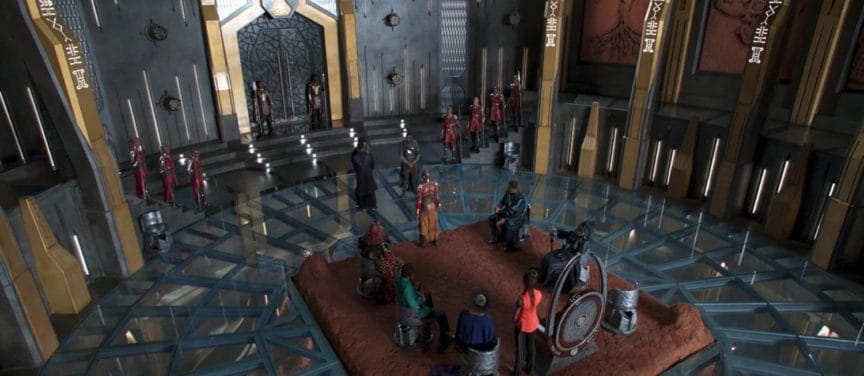
Meeting of the Tribal Leaders in Black Panther (Marvel 2018)
This visual conflict also plays out when we experience Wakanda for the first time. As we fly in, we get to witness its sprawling architecture firsthand. I’ll say this. For this being Ryan Coogler’s third feature-length film, I’m floored by his ability to craft a story regardless of a budget. Not that his movies were bad in any way; I thoroughly enjoyed my time with both films. Yet we have seen in the last few years how small filmmakers whither under the hot lights of a high profile feature length film. If someone were to tell me that the director of Fruitville Station (2013) and Creed (2015) was going to helm one of the most important films in the MCU, I would have been skeptical. Black Panther had to have the pathos, the weight, and the energy to properly make it stand out in the MCU library. But more importantly, it had to have Wakanda: a living, breathing city that serves as the foundation for a lot of what happens in the Marvel Universe.
Coogler cleverly uses his actors to introduce us to Wakanda, a basic narrative tool that is so underutilized in film-making today that it boggles the mind. When we need to know the importance of a Wakandan decree, we see the characters weighing in on its effects. When we need to know about the nation’s technological advances, we have a character introduce herself as a leading engineer. So many films rely on information dumps in the form of monologues or crawling text. Black Panther slowly reveals this world, giving us glimpses of what makes the nation unique and engaging. Coogler understands that many of us have bought a ticket just to see Wakanda: its people, daily life, architecture. This means that you must treat your world as its own living, breathing character, one that doesn’t look directly at the screen and say “I am morally ambiguous and will remain so for the entirety of this two hour running time.” We want Wakanda, but we also enjoy mystery and reveals. We want the alien and the familiar. Coogler understands this as he and Carter ensure that even its citizens take on moving tapestries of its lore. There is a definitive beauty in seeing an Afrofuturistic civilization on screen and I look forward to seeing more of Wakanda in what will surely be a bevy of sequels.
The Characters
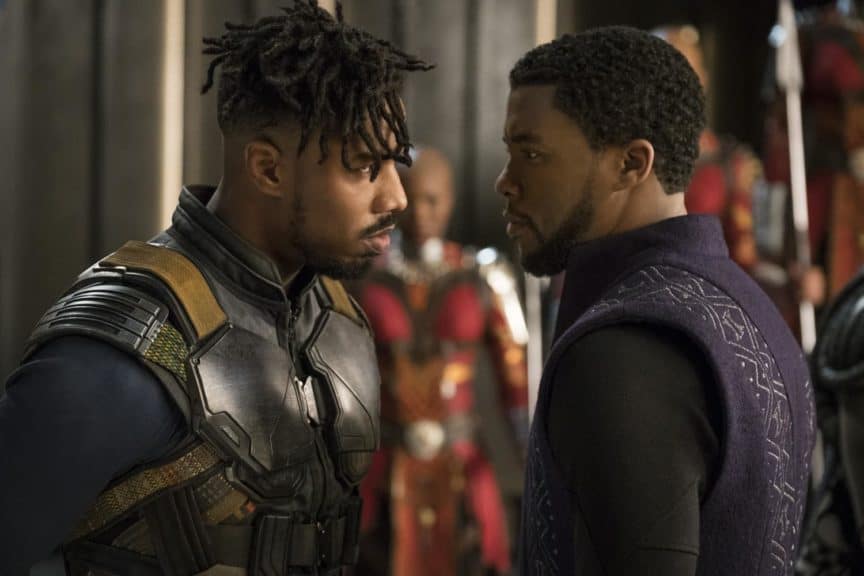
Michael B. Jordan and Chadwick Boseman face off in Black Panther (Marvel 2018)
Chadwick Boseman plays T’Challa as a stoic and contemplative hero. He is not only a king to an advanced civilization, but Black Panther is also one of the smartest men in the world. His influence has a far reach in the Marvel Universe and yes, he even turned down a seat with the Illuminati in the comics (so that should tell you what you need to know about his clout). Boseman’s quiet reserve is a breath of fresh air considering that he has the technology and riches of Tony Stark. His anger flashes only once during the entire film but as a result of immense emotional and personal strife. T’Challa is still young and had previously spent most of Captain America: Civil War (2016, dir. Joe and Anthony Russo) seeking vengeance for the loss of his father. This movie expands upon this as he comes to question the legacy of the man he adored. In every way, the movie can be dissected into the simple phrase “The sins of the father…”
Killmonger (played jovially by Michael B. Jordan) breaks the Marvel curse of completely forgettable and one-dimensional villains, and this is a testament to the work both Coogler and Joe Robert Cole put into the script. Marvel, in the past, has relied heavily on “evil for evil’s sake” antagonists: characters that are simply obstacles for our hero to overcome. This works for fairy tales and myths, but for quite some time, it seemed like Marvel forgot that actual adults watched their movies. Before this film, Winter Soldier and Loki were considered some of the best antagonists in the entire MCU and both are currently poised as rehabilitated anti-heroes. The Marvel Universe (and DC for that matter) has a problem making decent villains.
Killmonger represents a more mature approach to real-world antagonists; characters birthed in the fires of conflict. More importantly, Erik “Killmonger” Stevens is “evil” created from the intentions of “good.” There is a reason why more than one article and hashtag is floating around stating “Killmonger was Right.” Wakanda purposely isolated itself from every world war and conflict simply for self-preservation, which begs the question, “Is Wakanda truly the utopia we thought it would be?” This is something I didn’t expect to ask myself and was one of the reasons why I enjoyed the film so much. In many ways, the structure of Black Panther (i.e. the line of successions, brother turning on brother, empires with hidden pasts) has all the workings of Hamlet or Macbeth. Killmonger’s hatred of the world that abandoned him has both selfish and selfless undertones, while T’Challa’s own innocence is burdened by the task of saving his people at the expense of burning the steadfast traditions of his bloodline. I understood this conflict and the resulting fallout far more than the ones posted in Captain America: Civil War and this is saying a lot. Killmonger’s final lines in the film (“Throw me in the ocean with my ancestors that jumped off the slave ships because they knew death was better than bondage.”) becomes much more powerful when you understand that in many ways, “good” had not triumphed over “evil”. Our characters are complicated and forever changed due to their clash, making T’Challa and Erik Killmonger one of the best pairings Marvel’s ever created.
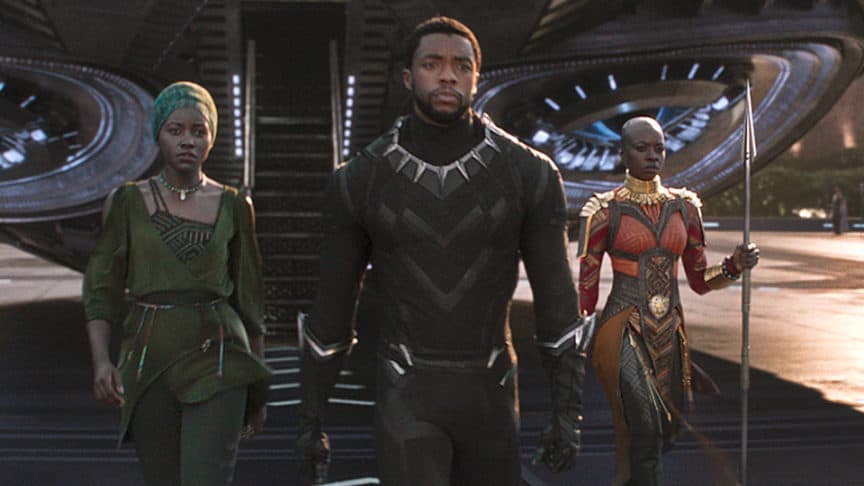
Lupita Nyong’o, Danai Gurira, and Chadwick Boseman in Black Panther (Marvel 2018)
The rest of the cast is superb. I mean, I can just run-off the names and let them speak for themselves. Lupita Nyong’o, Danai Gurira, Martin Freeman, Daniel Kaluuya, Letitia Wright, Winston Duke, Angela Bassett, Forest Whitaker, and Andy Serkis. Standouts, of course, go out Nyong’o and Gurira who hold their own alongside Boseman’s young king. Gurira, as Okoye, head of the Dora Milaje (the king’s bodyguards) plays up the badass warrior-type she has honed as Michone on The Walking Dead. This is especially brought out more in the third act where Okoye is split between her loyalty to T’Challa and her honor to the throne. Even as she makes her choice to turn her back on the people she loves, the audience only connects with her more because we believe in her as a woman of integrity and duty. As T’Challa, Okoye, and Nakia take a trip to South Korea, we get to experience Nyong’o’s Nakia as a veteran spy. These scenes switch the tone slightly to something reminiscent of a 007 film (I’m just saying, let’s not rule out possibilities here for future franchises). Finally, Letitia Wright as Shuri provides some of the best one-liners in the movie. Her tech-savvy and youthful charm meld perfectly with her African print workshop of gadgets and VR headsets.
Fans of this world and this character were not looking for a perfect stand-alone Black Panther movie. We wanted the first in a long-running series featuring the Wakandan king. Coogler delivers on all fronts and truly knows how to draw heavily on his actor’s performance to really bring out a scene. As for action, there are some good set pieces here. Not all are notable as I found the first scene too dark and a few of the later scenes in the film not fully realized in the CGI department. Coogler does give us a one-take action sequence in a South Korean casino (a callback to a standout scene from Creed) which is pretty exhilarating. He also knows when to properly let a scene carry for its intensity or levity, mixing both his low and high angle shots to frame his actors in ways that keep the audience engaged. A perfect example of this is when T’Challa is being challenged by Killmonger to speak his name in front of the tribal leaders. Coogler allows for Boseman to hold the scene with very little score or camera movement to distract the audience from what is a critical decision in the character’s development. Does he commit the same crime his father is guilty of or does he acknowledge the ills of tradition? T’Challa goes from a prominent young king to a man broken and Coogler leaves it right on the screen for us to witness.
Allowing the audience to learn through these characters is a powerful tool in world building. We get to connect to their passions and connections. We get to see that Wakanda works because of the roles each and every one of them plays, even if some of those roles are in direct conflict with one another.
Soundtrack and Composition
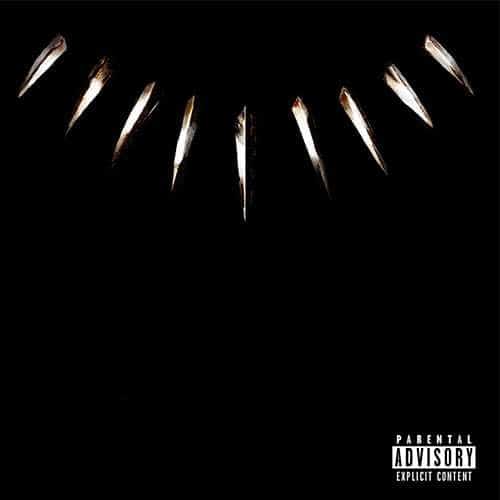
Cover of The Black Panther Soundtrack (Top Dawg Entertainment) |
Composer Ludwig Göransson and Senegalese musician Baaba Maal combined to create an amazing score for the film. To make sure that they captured the various influences and tastes of the continent, Göransson followed Maal during his tour of Africa. Stopping off at the various villages to experience their sounds and languages for himself, Göransson was inspired to compose the score for the film using the oral traditions of these people. The opening score alone, one which accompanies the origin of the Black Panther and Wakanda as a whole, hearkens back to the ways in which we learn of ancestral fables. I recommend listening to the score after viewing the film and seeing how Göransson was able to weave his audience through the highs and lows of this movie.
In contrast– and once again, feeding into the clash of culture Coogler is exploring– there is also the Black Panther soundtrack headed by Kendrick Lamar and his label Top Dawg Entertainment. Currently the number one album in the country, it’s safe to say that this collection of songs is wildly worth listening to. Featuring artists such as Schoolboy Q, The Weeknd, Sza, and Future, many would take this soundtrack as your usual artist compilation. But I think it’s worth comparing the hip-hop heavy soundtrack to the work Göransson put into the score to see how beautifully these two albums work to fit into the theme. Kendrick works in many references to the clash that T’Challa and Killmonger represent, but what is amazing is hearing how these two very distinct compositions work within the film itself. The two characters stand as reflections of the same mirror, one of African culture and the other of African-American influences. Two debate how these two very distinct cultures are navigating their identities and ties to one another is an essay written for another time, but it can be felt when you compare the two musical paths the film treads.
Light Scratches
While I greatly enjoyed my time with Black Panther, it’s not a perfect film. While the tone and visual flair stayed consistent throughout the brisk running time, there were a few elements that I feel were missed opportunities for the franchise. And I know that I might get some grief for this but I’ll just say it
The biggest problem with Marvel’s Black Panther is that it’s a Marvel movie.
Hear me out here.
Without Marvel and producer Kevin Feige going out on a limb and believing in Coogler and the Black Panther, we would have never gotten such a gripping rendition of the character. For this, I’m grateful. The problem audiences are facing now, and it’s one that all of the MCU films are having to deal with, is the formula Marvel has pumped into the social DNA.
We’ve seen villains opening up wormholes to distant nightmares and squabble over world-conquering super weapons. We’ve seen vast armies do battle at the end of almost every MCU movie with very little consequences established. That’s why when the third act of Black Panther turns into a small civil war, I lightly groaned. The battle itself was cool, and there were highlights for every character to shine, but when is Marvel going to realize that we don’t need a big battle to close out every movie? I’m all for conflicts between characters being fought out in real time, and yes I understand that this is a superhero movie, but once again I just sat through a film that posed some valuable positions on social issues. The “Marvel third act battle” works for larger films like Civil War or even the upcoming Infinity War, but I felt that there were better options to elevate the film passed what is now trope.
A smaller but still significant knock I’ll make on the film is the character of Everett Ross (played by Martin Freeman). While I liked Freeman’s performance, I’m left questioning the reason for his character apart from his ties to the MCU. During the second act of the film, Ross serves as the “fish out of water” character; the outsider coming to grips with the majesty of Wakanda. But why? I feel like introducing him in the second act, having him be the connection to the larger MCU tapestry, but then phasing him out before giving him any semblance of a role for the final battle would have been better. I understand that many people enjoy his character because he fills the role that a “token black character” would serve in a typical white-led cast. I get that. But they even go as far as giving him a critical role in stopping Killmonger’s final plan. Why? Wasn’t this the chance to have a completely self-sufficient black cast handle their own problems? Did we need the American savior? I would have loved if Shuri took this role instead. Not only would it have allowed her to expand her tech-role significantly, but would show some character growth as a young Wakandan protector.
I feel these are small scratches left on an otherwise great movie, but they are definitely worth noting for any future installments of Black Panther and the MCU as a whole. Marvel needs to understand that the kids who saw Iron Man (2008, dir: Jon Favreau) when they were ten years old are now registered voters. The MCU needs to grow with its audience.
Closing Remarks
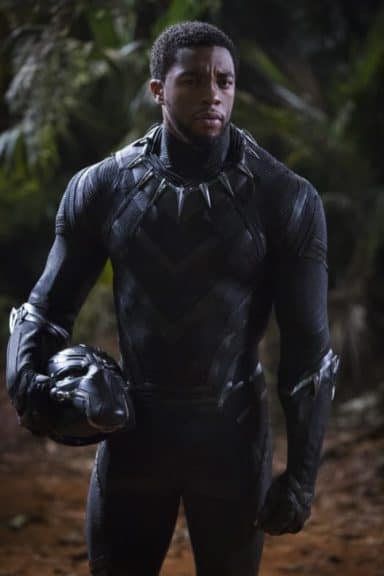
Chadwick Boseman as T’Challa/Black Panther (Marvel 2018)
Black Panther is a success for Marvel that I hope inspires other studios to want to further explore the nuances of black culture through cinema. To say that a film starring a black cast and helmed by a black director was a cultural event during my lifetime is inspiring for me as a writer. There was a lot riding on the success of a man dressing up as a cat and fighting crime (a lot more than another guy dressing up as a bat and the doing the same). Coogler and the entire cast have created what I hope is a standard for the movies people want to see. We want impossible fights and incredible vistas, but we also enjoy when they are mixed with deep social issues that don’t obscure the fun that a superhero film is supposed to be. All hail the king.

Alcy Leyva is a Bronx-born writer, teacher, and pizza enthusiast. He graduated from Hunter College with a B.A. in English (Creative Writing) and received an MFA in Fiction from The New School. Alcy enjoys writing personal essays, poetry, short fiction, book reviews, and film analysis, but is also content with practicing standing so still that he will someday slip through time and space. His first book “And Then There Were Crows” will be published July 3rd, 2018 by Black Spot Books. → Click here for more. ←

